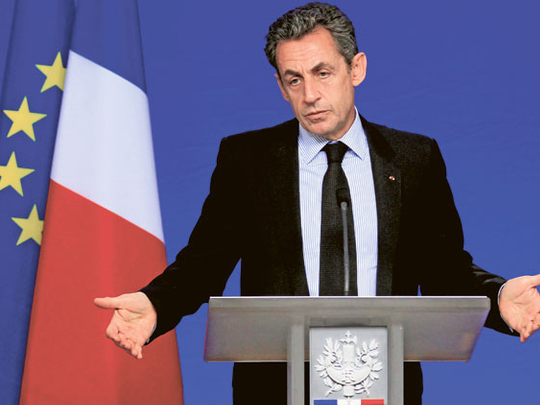
The stage was set this week for the feverish final countdown to France's presidential elections — now just a month away and looking less and less like a foregone conclusion. Instead, the campaign of an apparently racist and anti-Semitic serial murderer has stunned the country into aggrieved silence, foisting on politicians and society a painful and unexpected moment of reflection about the state of the nation.
Tuesday was supposed to mark the official launch of the presidential campaign, after which the 10 candidates who have mustered the required backing of 500 mayors must by law be accorded the same broadcasting air time.
After weeks of hogging the limelight, the big hitters — Nicolas Sarkozy, the conservative incumbent; Francois Hollande, his Socialist rival; and Marine Le Pen of the far-right National Front — can now be accorded no more coverage than anti-capitalist crusader Philippe Poutou or Jacques Cheminade, an oddball who wants to colonise Mars, compares Barack Obama to Adolf Hitler, and believes the West will be saved only if it teaches choral music to all three-year-olds.
But this year's cast of extras is still waiting in the wings while the campaign is effectively on hold as the nation mourns seven dead: three paratroopers killed last week — two Muslim, one of West Indian descent — and four Jews, three of them children, murdered in cold blood outside a school in Toulouse.
Before tragedy struck, many in France had complained that the presidential campaign was failing to address society's deep concerns about record unemployment, the sluggish economy and France's place in the world, descending instead into cynical populism, facile sniping and the courting of extremists.
On the loose
Then came the horrific attack of the scooter-riding killer, who calmly entered a school playground, grabbed a seven-year-old girl and shot her in the head. At the time of going to print, the gunman was surrounded by police and negotiating terms of a surrender.
For the first time in history, France has imposed the maximum scarlet alert level on the south-west, a category reserved for imminent threats of terror attacks.
Few dispute that Sarkozy is in his element at a time of crisis. This tragedy may well remind the French of an earlier episode in Sarkozy's career that first brought him to public attention.
In 1993, while mayor of Neuilly-sur-Seine, France's richest town, Sarkozy walked unarmed into a classroom and personally negotiated the release of children held hostage by a deranged man with an explosive belt, in what became known as the ‘human bomb' drama. It helped create the alpha male image that would eventually win Sarkozy massive popular support as France's tough-talking interior minister in 2002-04 and 2005-07.
But he will have a tough time changing the impression among many that he has inflamed tensions in France during his mandate, with initiatives such as a lame national identity debate, cracking down on Roma gypsies and controversially linking immigration and crime in a speech in Grenoble.
Sarkozy was even accused of milking emotions during a speech to secondary school children, when he told them: "The killer went for a little girl, I want you to think about that." In a Twitter reaction, ecologist Cecile Duflot said: "I think, Mr President, that one does not speak like that to children. The duty of adults is to protect, not stress [them]".
Game-changer
If these recent murders in part decide Sarkozy's future, it would not be the first time that an unexpected act of violence has changed the course of a French presidential campaign. In 1988, militants on the island of Ouvea, New Caledonia, took 27 people hostage in a cave, demanding independence from France.
Jacques Chirac, then prime minister, ordered an assault of the cave, authorised by incumbent Socialist president Francois Mitterrand just two days before the run-off between the two. Nineteen hostage takers and two soldiers were killed. Chirac gave his "warmest congratulations" to the military, despite the bloodbath. Mitterrand, who decried a "painful death toll", ended up winning.
Then in 2002, an unemployed gunman killed eight local politicians in Nanterre, leading Chirac to accuse his Socialist rival Lionel Jospin of failing to clamp down on violence and insecurity. Three days before the first round of elections, the TV channel TF1 led its news broadcasts with the bruised face of a pensioner beaten up in his home. The emphasis on security is said to have helped National Front leader Jean-Marie Le Pen to knock Jospin out in round one, leading to Chirac's victory.
Unlike 2002, the recent appalling murders are likely to soften candidates' discourse, according to political analyst Dominique Reynie. "What will change in the campaign is the violent tone. We will as a result be able to discuss real issues," he says. "I think that politicians who fail to respect that change of tone will be punished."
But given the recent violence, the time for calm debating has not yet come.
— The Telegraph Group Ltd, London 2012









